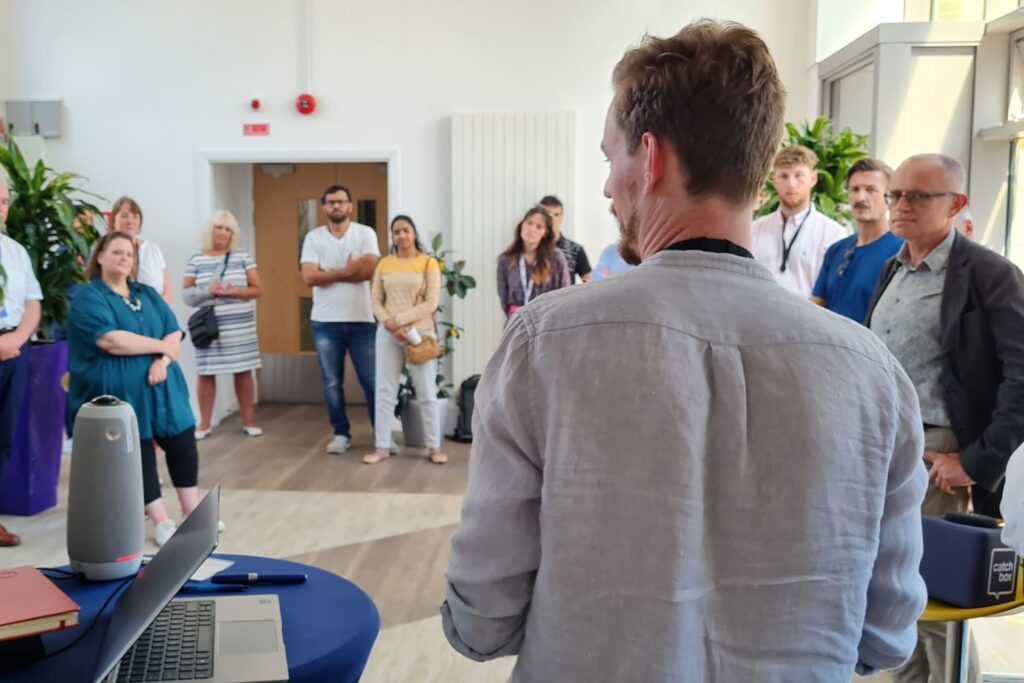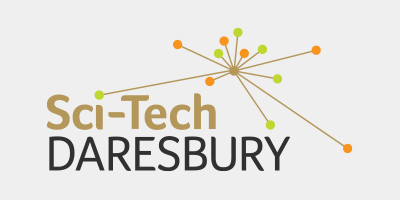January 16, 2025
STFC backs 28 game-changing start-ups to accelerate UK innovation

Latest update from our Joint Venture partner STFC. Image credit: STFC.
From saving lives to saving the planet, STFC’s latest £2 million drive will help start-ups bring new innovations to market quicker and succeed in global markets.
The Science and Technology Facilities Council (STFC) will welcome 28 pioneering start-ups to its successful network of UK Business Incubation Centres (BIC). This is part of its most recent £2 million drive to empower small businesses and stimulate the UK economy.
From coffee without the beans to better medications for Alzheimer’s disease, these companies join one of the UK’s most successful networks of business incubators, enabling them to bring their new innovations to market quicker and succeed in global markets.
From start-up to scale up
Science Minister, Lord Vallance, said:
“While new problem-solving products are being created by innovators across the UK every day, the hurdles to enable start-ups to scale up into successful businesses are often too high – from sourcing finance to accessing facilities.
Business Incubation Centres offer those key resources and this new investment will continue their work of backing science and technology to grow the UK economy.”
Solving problems that matter
Paul Vernon, STFC’s Executive Director of Business and Innovation, said:
“From faster breast cancer diagnosis to water-powered satellites, STFC is deeply committed to nurturing UK start-ups with transformative ideas that could shape our future.
These start-ups are using science and technology to solve problems that matter to all of us, including better and more affordable healthcare to protecting our planet for future generations. However, the journey from bold idea to successful business is rarely easy.
In alignment with the government’s mission to kickstart economic growth, STFC’s successful business incubation programmes provide an environment where businesses can overcome their industrial and business challenges to achieve world-changing success.”
Powering breakthrough innovation
In 2024 alone, STFC’s network of BICs delivered £78 million in economic impact to the UK economy. Since its inception in 2011, it has contributed over £350 million and helped more than 150 businesses thrive.
Each company will locate within one of STFC’s five BICs. They will collaborate with industry-leading partners with a focus in specific fields.
The five BICs are:
- Space (ESA BIC UK) with the European Space Agency (ESA), the UK Space Agency and the University of Leicester
- Biotechnology (Bio BIC), with the Biotechnology and Biological Sciences Research Council
- Digital and artificial intelligence (AI) (Digital BIC), with STFC’s Hartree Centre
- Quantum computing (QuBIC), with the National Quantum Computing Centre
- Health BIC, with the Liverpool City Combined Authority, the Medical Research Council and the Medicines Discovery Catapult
Tangible business benefits
In addition to funding, participating businesses gain access to world-leading research facilities, expertise and IP, resources that are typically inaccessible to start-ups, enabling them to overcome their industrial challenges.
In turn this enables them to accelerate the development of exciting new products that benefit our lives and the world we live in to achieve commercial success and create high value jobs.
The start-ups shaping a better tomorrow
From saving lives to saving the planet, among the start-ups entering the STFC BICs are companies developing technologies that will:
- improve diagnostics for sleep apnea
- improve drugs for Alzheimer’s disease
- reduce the deforestation and carbon footprint associated with coffee production
- provide property developers in coastal areas with detailed environmental impact assessments
- develop AI tools for people suffering from dementia or loneliness
- design new technologies to support quantum computing
- develop low carbon panelling for construction industry
- develop ultra sustainable protein for shakes
- design new treatments that increase antibiotic effectiveness
- monitor shipping containers to protect cargo during transport
The 28 new incubatees bring the total number to join the STFC BICs this year alone to 43 companies.
Bespoke business support
Across the BICs, each start-up benefits from bespoke business coaching and access to specialist industrial clusters at STFC’s BIC locations nationwide:
- Harwell Campus, Oxfordshire
- Sci-Tech Daresbury, Liverpool City Region
- The Royal Observatory, Edinburgh
- Space Park, University of Leicester
Furthermore, with half of the supported companies based outside London and the south-east, this underlines how the BICs are supporting start-ups from all nations and regions of the UK.
Blueprint for success
Since the launch of the ESA BIC UK in 2011, this programme has supported more than 130 space tech start-ups, creating more than 1,000 highly skilled jobs and £225 million investment collectively.
This same model has since been used as the blueprint for the four other deep tech incubation centres, the most recent being the Health BIC, launched in October 2024.
Collectively, the incubatees are generating a 25-fold return on investment for the UK taxpayer and boast a 95% survival rate, well above the national average.
From science to market success
Will Gault, Business Incubation Programmes Lead at STFC will work directly with each start-up on joining the BIC programme. He said:
“Deep tech start-ups often face barriers to commercialisation due to high costs and technical challenges. By providing vital, tailored support, we’re helping to bridge the gap between laboratory breakthrough and profitable business.
This is where cutting-edge science meets bold market potential for the benefit of society. I’m looking forward to welcoming each these exciting new businesses to our BIC programme, and supporting their journey to commercial success.”
Full list of new start-ups to join the BICs
ESA BIC UK
Location: Harwell Campus, The Royal Observatory Edinburgh, Space Park Leicester
- RouteZero: Climate-tech company that decarbonises business travel via innovative digital tools that reduce company emissions by 26% whilst balancing the time and budget of journeys.
- Saif Systems: Develops software to help satellite operators ensure that autonomous systems (like refuelling or moving a satellite out of orbit) are operating safely.
- Applied Atomics: Builds a combined propulsion system for satellites that can both transfer them to different orbits and also keep their station, using water as a propellant.
- Aspia Space: Transforms Earth’s complex data into actionable insights for informed decision-making across sectors by combining proprietary AI, ground truth data and expert knowledge.
- Ocean Ledger: Provides property developers and planners in coastal areas with environmental impact assessments, using analysis of earth observation images.
- Journey Protector: Monitors shipping containers to ensure that no tampering or problems with the cargo occur during transport and to allow faster movement through ports, using precise GPS / GNSS data and sensors within the containers.
- Voyant Innovations: Provides predictive models of where space debris will be, helping satellite operators to avoid collisions and reduce their insurance costs.
- Gyroplant: Provides reusable and space-friendly substrates for growing food on manned space missions as well as vertical farming on earth.
- Meta Futura Aerospace: Develops the most manoeuvrable and agile satellites in the space industry, empowering current missions with their full potential and enabling the future of space technology.
- SEA SAT: Monitors coastal ocean health for fisheries and other aquaculture companies, using special analysis of earth observation images that sees under the surface of the water.
- SensFish: Provides near real-time images and maps of marine areas to help monitor fishing vessel activity.
- Aegion Aerospace: Creates high-performance metal alloys for use in extreme environments, such as rocket engines.
Bio BIC
Location: Daresbury Laboratory
- Signatur Biosciences: Makes precision diagnostics accessible, starting by decentralising breast cancer prognosis to reduce patient diagnosis times and lower hospital costs.
- BioTryp: Develops a novel treatment for bacterial infections (starting with urinary tract infections), that increases antibiotic effectiveness and reduces recurrence by preventing biofilms.
- FermTech: Creates ultra-sustainable protein ingredients – koji protein – used in protein shakes and supplements, baking, ready meals, and dairy applications.
- Morrow (Nihilo Food Systems): Creates coffee without coffee beans, using natural, sustainable and upcycled ingredients that replicate the flavour and aroma of coffee, for coffee shops, food manufacturing and at home.
- Cresco Biotech: Makes low-carbon panelling materials for the construction industry, to replace materials like plasterboard in green construction projects.
QuBIC
Location: Harwell Campus
- TreQ: Builds and operates open-architecture quantum computing clusters that are upgradeable and extensible, improving capital efficiency and technology resiliency.
- Quantopticon: Provides photonic quantum simulation and design software for photonic, optical quantum computing, quantum networking and quantum sensing components. Cuts time and cost for quantum technology R&D.
Digital BIC
Location: Daresbury Laboratory, Sci-Tech Daresbury
- Talk it Out: Is building a mental health app that uses AI to help people understand their subconscious thoughts and the emotions they create, reducing anxiety and burnout.
- Decently: Develops an app (Melo™) for clinical teams caring for patients who display complex behaviours due to neurological conditions.
- SenseAI: Provides a method to speed-up analysis of electron microscopy and other imaging, using smart sampling and inpainting to reduce scanning times.
Health BIC
Location: Daresbury Laboratory
- Currant Care: Sensora platform provides non-invasive, AI-powered monitoring for real-time alerts and analytics to caregivers, enabling data-driven and efficient care for elderly and disabled patients.
- Lola By Leaf: Leaf AI provides conversational AI for care organisations & people and families affected by dementia and/or social isolation and loneliness.
- BBL Protect: Manufactures a Personal Isolation and Transport Device for safe and efficient transportation of infectious, contaminated or immunocompromised patients in healthcare settings.
- Neurovate: Develops drugs for central nervous system disorders, starting with Alzheimer’s disease, that work at lower dosage and reduce patient side-effects.
- Apnea-Tech: Builds a low-cost and sustainable screening and diagnostic device for sleep apnea that speeds-up diagnosis and reduces healthcare costs.


